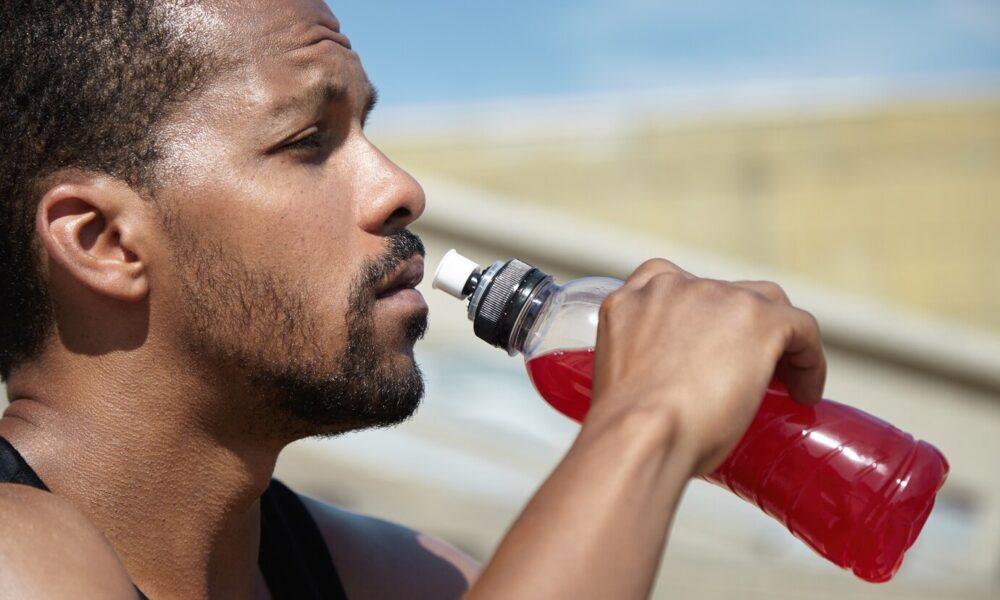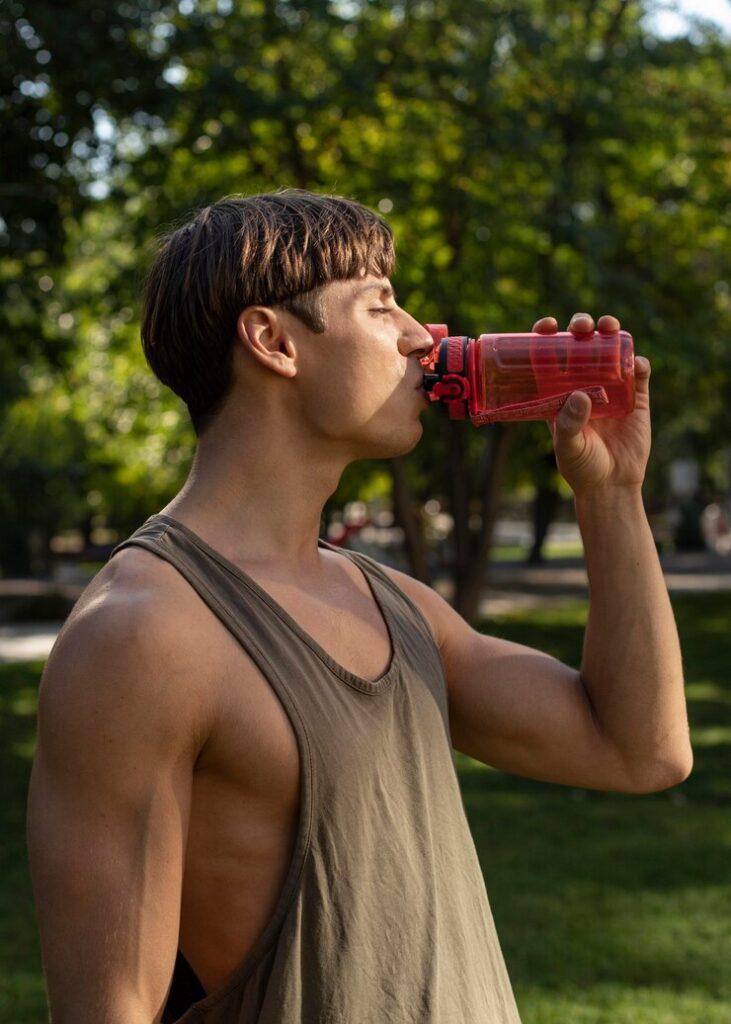
When you reach for an energy or sports drink to keep you going at the gym, it’s easy to think it’s just a quick boost. But these drinks have some distinct differences, both in ingredients and impact on your body. Sports drinks like Gatorade and Powerade claim to hydrate and replenish electrolytes, while energy drinks like Celsius, Bang, and Monster promise increased energy and alertness.
But is that jolt in a can doing you more harm than good?
Let’s break it down.
The roots of energy and sports drinks trace back to addressing specific needs for hydration and stamina. Sports drinks were born in the 1960s when a team of scientists developed Gatorade to help football players at the University of Florida stay hydrated and maintain energy during grueling games. The drink quickly gained popularity among athletes for its blend of water, electrolytes, and sugar, setting the standard for modern sports drinks.
On the other hand, energy drinks entered the market in the late 20th century. Red Bull, launched in Austria in the late 1980s, drew inspiration from a Thai beverage designed to combat fatigue. Red Bull’s mix of caffeine, taurine, and sugar soon became a global sensation, marketed not just to athletes but also to professionals seeking a mental and physical boost.
Over the decades, energy and sports drinks have evolved into multi-billion-dollar industries, with products now tailored to various lifestyles and exercise needs.
Energy drinks contain stimulants like caffeine and sugar for a quick energy burst but often lack nutritional value, leading to potential side effects. In contrast, sports drinks focus on hydration, electrolytes, and carbohydrates to fuel and restore your body during prolonged exercise. But even sports drinks aren’t as straightforward as they seem—they may contain sugar and artificial flavors that could add unnecessary calories without real nutritional value.
Sports drinks like Gatorade and Powerade claim to hydrate and replenish electrolytes, while energy drinks like Celsius, Bang, and Monster promise increased energy and alertness. Each type of drink is crafted with a distinct purpose in mind: sports drinks aim to maintain hydration and replenish nutrients lost through sweat, especially during prolonged or high-intensity physical activities. These beverages are typically enriched with electrolytes such as sodium and potassium and may include carbohydrates to restore energy levels.
Energy drinks primarily focus on stimulating the nervous system with ingredients like caffeine, taurine, and sugar, providing a quick surge of energy and mental alertness. However, the overlap in their marketing often blurs the lines, with many people consuming them interchangeably, potentially leading to misuse or overconsumption. Understanding these differences is key to choosing the right beverage to support your workout goals without compromising your overall health.

Most energy drinks are loaded with caffeine, often around 70-240 mg per can, which is more than a cup of coffee. Here’s what happens:
- Short-Term Benefits: Caffeine and sugar provide an immediate energy boost, sharpen focus, and enhance alertness, making it easier to power through workouts. Some energy drinks contain added vitamins, like B12, that can help with energy metabolism.
- Long-Term Benefits: Occasional use of energy drinks may be helpful for an extra push in intense training sessions, but experts advise keeping them in moderation to avoid dependency on artificial energy boosts.
While they offer that temporary boost, energy drinks come with significant health drawbacks.
- Short-Term Disadvantages: Overconsumption can lead to headaches, jitteriness, anxiety, and elevated heart rate. Excessive caffeine, especially alongside sugar, may disrupt sleep cycles, leading to exhaustion after the initial “buzz” wears off.
- Long-Term Disadvantages: Regular use of energy drinks has been linked to higher risks of cardiovascular issues, including heart palpitations and high blood pressure. Some studies also suggest a correlation with anxiety disorders, weight gain from high sugar levels, and even tooth decay.
Here’s a table comparing some of the most popular energy drinks:
| Energy Drink | Caffeine (mg) | Sugar (g) | Calories | Notable Ingredients |
|---|---|---|---|---|
| Celsius | 200 | 0 | 10 | Green Tea Extract, B Vitamins |
| Red Bull | 80 | 27 | 110 | Taurine, B Vitamins |
| Monster | 160 | 54 | 210 | Ginseng, Taurine |
| Bang | 300 | 0 | 0 | Super Creatine, CoQ10 |
Sports drinks are designed to rehydrate and replenish electrolytes. They’re beneficial for long, sweaty workout sessions where you lose a lot of salt and water. Here’s the breakdown:
- Short-Term Benefits: These drinks provide quick hydration and help replenish electrolytes like sodium and potassium, which your body loses through sweat. Carbohydrates in sports drinks provide an immediate energy source, which helps sustain performance in endurance activities.
- Long-Term Benefits: When used correctly, sports drinks can be a valuable tool for athletes engaged in prolonged, intense activities, supporting hydration and helping prevent muscle cramps and fatigue.
The sugar content in some sports drinks can make them less than ideal, especially if consumed outside of rigorous physical activity.
- Short-Term Disadvantages: Drinking sports drinks without the need for rehydration may lead to unnecessary sugar intake, causing a spike in blood sugar levels. Some drinks also contain artificial colors and flavors that may cause mild digestive discomfort in some people.
- Long-Term Disadvantages: Regular use, especially outside of high-intensity exercise, can lead to weight gain, blood sugar imbalances, and increased risk of type 2 diabetes.
| Sports Drink | Calories | Carbs (g) | Sodium (mg) | Potassium (mg) | Sugar (g) |
|---|---|---|---|---|---|
| Gatorade Thirst | 140 | 36 | 270 | 75 | 34 |
| Powerade | 130 | 34 | 150 | 40 | 34 |
| DayLyte | 0 | 0 | 50 | 150 | 0 |
| Nuun Performance | 60 | 15 | 360 | 210 | 13 |
If you’re looking for a more natural way to stay hydrated and energized, here are some healthier options:
- Coconut Water: Known as “nature’s sports drink,” coconut water is rich in potassium and low in sugar.
- Fruit-Infused Water: Adding slices of fruit like lemon, berries, or cucumber provides a subtle flavor and vitamins without added sugars.
- Green Tea: With a moderate caffeine level and antioxidants, green tea is a great alternative that offers a slight boost without the downsides of energy drinks.
- Beet Juice: Studies suggest that beet juice can improve endurance by increasing nitric oxide levels, which helps blood flow.
- Homemade Electrolyte Drinks: Combining water with a pinch of sea salt, lemon juice, and a teaspoon of honey creates a simple and effective electrolyte drink.
To make an informed decision, think about why you’re reaching for a specific drink. If you’re an endurance athlete or training in intense heat, a sports drink can be beneficial in moderation. For a quick boost, consider green tea or coffee rather than energy drinks loaded with sugar. And remember, your body’s natural state thrives on whole, nutrient-dense foods and adequate hydration.
Key Takeaways:
- Energy drinks can be helpful in moderation for short-term focus, but they pose serious long-term health risks if overused.
- Sports drinks are generally beneficial for intense, long-lasting workouts but should be avoided as a casual drink due to high sugar.
- Natural alternatives provide similar benefits without the additives, making them a safer, healthier choice for most people.
In the end, whether you choose an energy drink, sports drink, or natural alternative, the key is moderation and purpose. Drink smart, stay hydrated, and keep your body’s health in mind as you push your limits at the gym.
